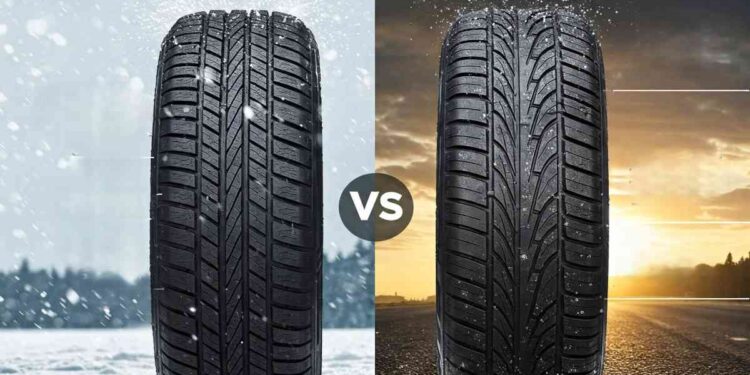All season tires and summer tires are probably the most cross-shopped of all tire categories. For millions of drivers who reside in regions of the country where seasonal changes are more moderate, the case for either type of tire can often be made.
This article will outline some of the advantages & disadvantages of both summer tires and all season tires, and hopefully guide you in making the most appropriate tire selection for your climate and purposes.
Why Choosing the Right Tire Matters
First of all, know that the seasonal designation of tires is meaningful and important. When tire manufacturers represent tires as “summer tires,” or “all season tires,” it’s not some ploy to sell more tires, more varieties of tires, or simply rebrand equivalent tires to achieve a wider audience appeal.
The Real Differences Between Summer & All Season Tires
Summer tires are not interchangeable with all season tires, which in turn are not interchangeable with snow tires, etc. The various types of tires differ significantly in design and construction, and are engineered only to perform as indicated.
What Makes Summer Tires Unique?
Summer Tires Are Designed for Warm Climates
Accordingly, summer tires must be used only in temperate and warm climates.
There is no universal and hard cutoff point for summer tires when it comes to temperature, but we recommend a reference point of 40° Fahrenheit. Generally speaking, above 40° Fahrenheit summer tires function as intended. Much below 40° and things can get sketchy.
Contrary to popular belief, it’s not just the wintry precipitation factor that precludes summer tire use in cold conditions; it’s actually what happens to the rubber compound of summer tires in those temperatures.
Why Summer Tires Struggle in Cold Weather
In cold temperatures, the rubber compound of summer tires loses its elasticity and pliability. (Called “glass transition” by tire nerds.) The byproduct of this transition is a loss of road traction, even potentially on bone-dry roads. And the more aggressive, and performance-oriented the summer tire, the more drastic this compound transition becomes. (Extreme performance summer tires, for example, shouldn’t even be subjected to freezing temperatures in storage.)
Summer tires are also known to “object” to freezing temps with cracking, and overall surface degradation. You don’t want that…
Performance Benefits of Summer Tires
So if you reside in a region that rarely, if ever, experiences sub-40° temperatures, here are some reasons you might select summer tires over all season tires –
1. Summer tires have superior grip and performance in dry road conditions.
This is especially true when it comes to a performance summer tire like the Michelin Pilot Super Sport being fitted to a performance-oriented vehicle. There is no all season tire that can match a performance summer tire dynamically – not in straight line acceleration and braking, limit handling, and so on.
2. Summer tires also hold a performance advantage when it comes to WET Road performance.
Due to the exclusive summer application, tire engineers have accounted for essentially two road condition variables with summer tires: dry and wet. Both are therefore optimized.
3. Summer tires offer better steering feedback, response, and tactility.
Okay, this might sound a bit esoteric, but actually the preferable road feel that a quality summer tire provides can be experienced and enjoyed by almost any driver. For those residing in the majority of the country where sub-40° is a likelihood or certainty, the good news is that all season tire technology continues to evolve and advance. Though unarguably still present, the performance delta between high quality all season tires and summer tires is narrower now than ever before, and the overall compromise is less.
All season tires offer the following advantages –
– Year-round, any temperature versatility. Obvious, we know. But the any temperature capability means that you can avoid the anxiety as your outside temperature gauge nears the freezing mark. All season tires also facilitate a “go anywhere, anytime” travel posture; fall/winter road trips into northern climates, and travel into higher elevations where weather conditions may be unknown and changing, for example.
– All season traction in any road conditions. We promise you that the first time you experience snowy or icy roads with summer tires, you’ll do whatever is necessary to avoid duplicating that experience. While not on the level of snow tires (see Snow Tire Information & Perspective), you’ll spare yourself the terrifying experience with true all season tires.
– Positive, enjoyable performance in all conditions. A high quality all season tire is a jack of all trades, master of none. You’ll give up some dry and wet road performance to a summer tire, but in the majority of street driving contexts the performance differential is barely perceptible. Instead of focused performance in one season, you’ll achieve solid, balanced performance in all seasons.
– Superior treadlife. There are exceptions to this rule, but generally speaking all season tires offer superior tread life to summer tires, and also offer more favorable tread life warranties, i.e. the manufacturers expect all season tires to last longer.
– Less initial cost. Also not a universal truth, but summer tires often come at a premium. High performance = high cost.
Final Verdict & Recommendations
Our advice: When to Choose Summer vs. All Season
if you live somewhere north of South Beach, then there’s a lot of appeal to a quality all season tire. Summer tires certainly have their advantages, but if you need one set of tires for year-round use, and words like “fall” and “winter” are in your lexicon, then it’s most likely that an all season tire is preferable.
Performance Car Owners: What’s the Best Option?
If you own a performance-oriented coupe, sedan, or sports car and are worried that an all season tire might bring down your fun factor in the summer months, we won’t necessarily disagree. For you, Mr. Earnhardt, we would suggest a summer tire/snow tire combination, i.e. two sets of wheels + tires.
Remember that not all tires are created equal, and you should definitely do your due diligence and research before settling on a tire from either category. For example, not every all season tire lives up to the all season billing…
Here’s a quick comparison table:
| Features | All-Season Tires | Summer Tires |
|---|---|---|
| Temperature Range | Wide range | Above 40°F (7°C) |
| Dry Traction | Good | Excellent |
| Wet Traction | Good | Excellent |
| Snow Traction | Light snow | Not recommended |
| Tread Life | Superior | Moderate |
| Noise Level | Moderate | Can be louder |
| Cost | Moderate | High |
Which Tires Are Best for You?
- If You Live in Warm Climates (Choose Summer tires…)
- If You Experience Cold & Snow (Go With all season tire…)
- Performance Car Owners: summer tire/snow tire combination



